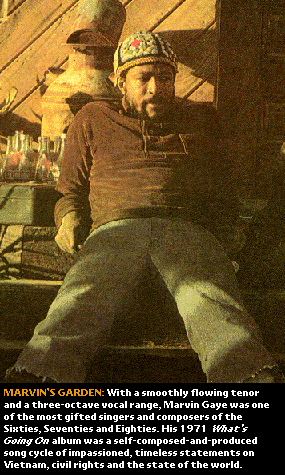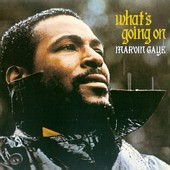|
"What's Going On" Marvin Gaye Tamla 54201 Mar. 1971 Billboard: #2
The record opens in the midst of a party, but the despair and ambiguity of "What's Going On" become obvious the second the music starts. The inanity of the party atmosphere, which carries through the recording, contradicts Gaye's intense, humorless performance. The result is a singer who sounds utterly alienated by his surroundings and desperately needs a link to the rest of the world. He sees no more sense in the mindless babbling of the party revelers than he does in the tragedies of life. Motown completely missed the point and deemed the recording unfit for commercial release. To be fair, "What's Going On" featured a performance and production that were so idiosyncratic they seemed destined to fail. Judging from the nearly ridiculous noncommerciality of some of Gaye's past projects, it wasn't hard to sympathize with the label's point of view, but times had definitely changed. Gaye was insulted by Motown's pedantic attitude and issued an ultimatum: if they wouldn't release "What's Going On," he would no longer record for the label. Reluctantly the single was issued and reached #2 on the pop charts. The American public immediately sensed the relevance of "What's Going On." The heady optimism of the '60s was dead. Ambiguity and confusion were its byproducts, and "What's Going On" indirectly captured the spirit of a nation wounded by political divisiveness. Gaye, because of his honest pursuit of art, became a seer. What's Going On was the name of the album that linked Gaye's triptych of hits ("What's Going On," Mercy Mercy Me," and "Inner City Blues"). Throughout the album, Gaye redubs his vocals layer upon layer, in effect creating an atmosphere of spirituality. He was supposedly attempting to overcome an inferiority complex concerning the power of his tenor, but in the process he invented vocal multitracking. To be sure, for years artists had been recording their vocal parts in layers using a process known as doubling. The point of doubling was to duplicate the base vocal as closely as possible, to give the impression of one voice with the presence of more than one. Gaye was unconcerned with following the lead vocal. He would harmonize, ad-lib, or echo a phrase as he pleased. The effect was a chorus of scattered Marvin Gayes, each one apparently rendering a different subconscious thought. By escaping the lineal vocal line concept, he expressed a depth of emotion that was beyond the reach of straight singing. He could answer or question his own phrasing, and this helped make the album a tour de force in expressiveness for popular music. - Thomas Ryan, American Hit Radio, Prima Entertainment, 1996.
No comments so far, be the first to comment. |


